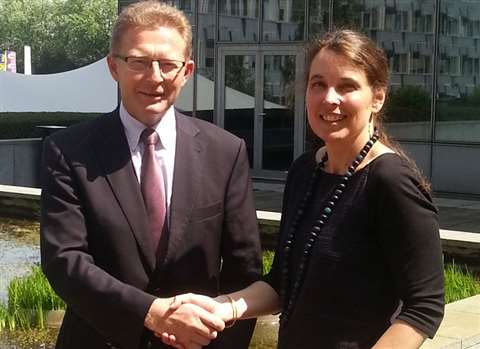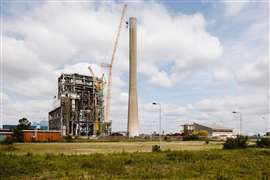CECE calls for quick emissions decision
17 October 2014

New emissions regulations should be approved quickly to allow manufacturers to proceed with the changes that will be necessary for their machines, according to Eric Lepine, president of CECE (the Committee of European Construction Equipment).
“We want the Directive through as fast as possible,” he said. “When the text is approved, we can transform our machines and redesign them.”
Speaking alongside CECE's new secretary general Sigrid de Vries at CECE's 2014 Congress in Antwerp, Belgium, he said that in a fast and ever changing environment, construction equipment companies needed to be flexible and agile to cope with unpredictable markets, a demanding regulatory environment, and the need to deliver the latest technology.
He also called on EU policy makers to play their part in ensuring strong, competitive industrial production in Europe.
The topic for the Congress was the Construction Equipment Industry in an Agile World.
Lepine, who is also managing director of Caterpillar France, said, “A strong industrial manufacturing base is important for economic resilience and growth.”
As part of the 2020 strategy for smart, sustainable and inclusive growth, the EU had looked to lift the share of the industry in Europe’s GDP to 20% by 2020. However, the ratio of industrial production dropped from 16% in 2011 to 15.1% in 2013.
“We fear that this issue will be downplayed”, said Lepine. “To win in Europe, we will need a concerted effort by business, policy makers and other stakeholders in society.”
He said that the construction equipment industry was willing to play an active part in reaching the goals set by the EU. However, he said, EU policy makers would have to set the right framework conditions, providing business with planning certainty, coherent policies, access to finance, room for innovation and facilitating the access to foreign markets.
“We urge the European Commission to confirm and even upgrade the industrial production target in the coming months, and the EU governments then to endorse this in their economic spring summit in 2015,” said Lepine.
CECE's priorities in Brussels include the upcoming emissions regulation, external trade and access to foreign markets, and market surveillance.
Global alignment
As well a swift decision on exhaust emissions regulations for off-road vehicles, Lepine called for sufficient lead time and global alignment.
He pointed out that the European Commission had published its proposals covering exhaust emissions reduction for engines installed in non-road mobile machinery, setting standards for construction equipment and other machinery that were the strictest in the world.
He said that European construction equipment manufacturers already produced the cleanest and safest machinery in the world but that delivering the next generation of all machines to the market in time would remain a complex challenge.
With product cycles long and product diversity huge, he said that a tremendous strain would be put on development time. The sector will work with the EU institutions to obtain further refinements in the proposal, and secure swift adoption in order to preserve elementary lead-time ahead of entry-into-force.
He said that CECE was unhappy with two points in the proposals as they stand at the moment. The first is that, unlike current regulations, there is no provision for replacement engines. This means that if needed, an engine in a machine could be replaced only by an equivalent engine if it was already in stock. The building of older-style engine would not be allowed.
The second point is about a provision for companies producing fewer than 100 machines a year to be allowed an extra 12 months to comply with the new regulations. The original request from the industry was for extra time for smaller ranges and not just smaller companies, and Lepine said the proposals as they stand were not acceptable.
Transatlantic
CECE said the Transatlantic Trade & Investment Partnership (TTIP) talks would benefit the construction equipment industry.
“We are happy that the machinery industry has now been included in the TTIP negotiations currently underway between the US and the European Union,” Lepine said.
He added that the construction equipment industry would benefit in particular when it came to regulatory convergence and harmonisation of technical and environmental requirements applying to machines, to public procurement liberalisation and to third countries market access for re-manufactured products.
Lepine said that if successfully negotiated, business would be made easier and costs reduced for manufacturers acting on a global scale and for customers.
CECE said that in the first half of 2014, construction equipment sales on the European market had grown by 10.2% compared to the same period in 2013. It said recent figures released by CECE showed demand had been strong in the first quarter of this year but that the business climate had decreased markedly after summer.
It said that after the long dry spell, construction equipment sales in the Southern European countries like Italy, Spain and Portugal had improved notably, signalling that the European construction sector was now stabilising after having hit the bottom – with positive effects on the construction equipment market.
However, it warned that market demand might cool down further in the second half of the year, particularly in countries like Germany, France and the UK.
“Looking at 2014 as a whole, robust growth figures across product groups and countries still seem realistic”, said Lepine.
STAY CONNECTED


Receive the information you need when you need it through our world-leading magazines, newsletters and daily briefings.
CONNECT WITH THE TEAM










